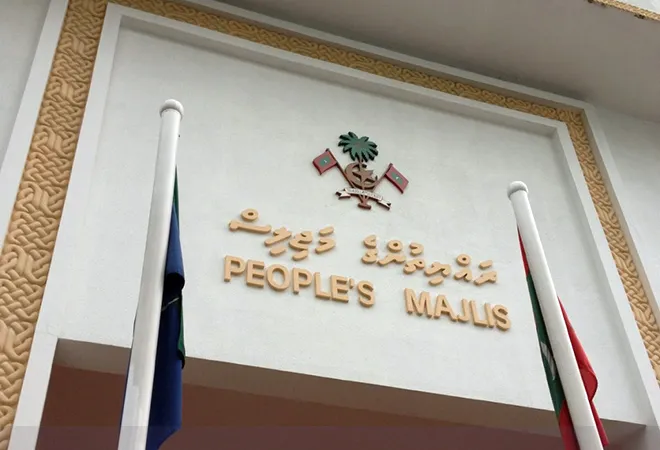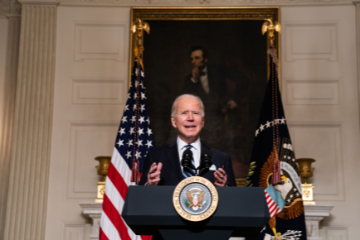
Coming as it does in a series of misuse and abuse of constitutional powers under a succession of multi-party governments, the worsening situation under President Abdulla Yameen has raised a more basic question: Is western democracy suited to Maldives, with its 1000-plus years of history of one-man rule, by whatever name is called, and has failed the Indian Ocean archipelago-nation even before it started?
The immediate provocation is of the Government of President Yameen summoning the armed forces to discipline unruly Opposition MPs inside Parliament, and use and misuse other ‘Independent Institutions’ like the Supreme Court and the Election Commission under the 2008 ‘pro-democracy’ Constitution.
The most recent phase began with the Supreme Court fast-tracking the ‘disqualification’ of 10 Yameen camp MPs who crossed over to the Opposition ranks without directing the government to get the Parliament pass a law for the purpose. Though the SC verdict commended anti-defection law in nations like India, it did not cite the legislative route that each one of them had taken.
Whatever the intention, the EC has kept the Opposition hopes alive by declaring four vacancies, requiring fresh elections within two months. The law does not bar the ‘disqualified’ MPs from contesting again, and the four-party combined Opposition has declared their unstinted backing for them. The Yameen faction of the ruling PPM, once chaired by half-brother, former President Maumoon Abdul Gayoom, has initiated ‘disciplinary proceedings’ against the other six, lest their possible re-election supported by the combined Opposition should render the Government weak.
The Opposition’s ‘remove Speaker’ plan has two goals. It was to create the right momentum for encouraging more defections from the Yameen camp. This in turn was to provide the two-thirds majority required for Yameen’s impeachment, and possibly that of Vice-President Abdulla Jihad, before the mantle passed on to a new Speaker of their choice, mandated to conduct fresh presidential polls within 60 days.
If successful in the earlier rounds, the Opposition might also consider having Yameen disqualified through legal/constitutional processes from the November 2018 presidential polls, and also get former Presidents Gayoom and MDP’s Mohammed ‘Anni’ Nasheed re-qualified. Gayoom, along with Jumhooree Party’s Gasim Ibrahim, is age-barred under a new law Yameen passed with MDP’s early help in Parliament. Nasheed is disqualified after courts handed down a 13-year jail-term, followed by a jump-jail charge when he obtained ‘political asylum’ in the UK when on ‘medical leave’.
The Yameen leadership has followed up on these actions against individual Opposition leaders, including Sheikh Imran, the jailed leader of religious-conservative Adhaalath Party (AP), through repeated arrests of Gasim Ibrahim, and also Gayoom’s parliamentarian-son, Faaris Maumoon, a likely presidential candidate otherwise, if there is no change in the prevailing situation. Other presidential aspirants of the strong, combined Opposition, may suffer similar fate between now and November next year.
Both Gasim and Faaris have been charged with bid to bribe Yameen MPs ahead of the two ‘failed’ attempts at removing Speaker Maseeh in the past few months. Gasim and many other unnamed leaders have also suffered huge financial losses after successive Government clamp-downs on their businesses for their real or perceived identification with the Opposition. There is thus no denying the lack of enthusiasm on the part of the public, including Opposition cadres, to join anti-Yameen street-protests, which was the hallmark of the early months of the Opposition protests, which commenced in December 2014, only a year after he became President.
With Gayoom still heading the ruling PPM, the MDP-led Opposition commenced the anti-Yameen street-protests with the hope of repeating their success with Gayoom’s removal in 2008, it was not to be. If they counted on their expertise as better street-fighters and also better rapport with the international community (read: West), they had discounted other facts that were staring on their face.
Having painted Yameen as a ‘gang leader’ and his aides as nothing more than street-thugs in the years before he became President, the MDP in particular all along discounted his ability to think and think ahead and on his feet. After 30 years of ‘autocratic misrule’, Gayoom had allowed political moss to grow under his feet and before his own care.
Yameen may have been new to the job but he had learnt the Opposition’s tactics, which remained unaltered and unimproved in the face of a younger and more ambitious leader. He belongs to Nasheed’s generation, and not Gayoom, who was two decades older, and thought and acted like a leader from that generation – but the Opposition did not care.
Revisiting Constitution
Questions about the need for Maldives to revisit the ‘democracy Constitution’ assume significance for a variety of reasons. One, no leader, starting with former President Nasheed, was as ‘democratic’ as the MDP wanted or believed. Today, a deadlocked political process, with possible continuance of Yameen through a so-called democratic election next year could lead to further legitimisation of autocracy, which seems to have been in Maldivian political blood all along.
Under the Yameen leadership, Parliament Secretariat summoned the armed forces (as allowed under relevant rules), purportedly to ensure quiet in the House and the immediate surroundings. Nasheed has scared early Maldivian democratic experience by shutting down the Supreme Court until the Opposition-controlled Parliament gave him a Supreme Court Chief Justice of his choice.
President Nasheed’s decision to have Yameen and Gasim arrested using the armed forces, and also Criminal Court Chief Judge, Abdulla Mohamad, similarly arrested after the latter granted bail to a jailed Opposition leader, created consternation among democracy lovers in the country even at the time. The peak was reached when the Nasheed presidency withdrew both the armed forces and police security for the massive ‘December 23’ Opposition-linked public rally of weeks, for the protestors to face the wrath of angry MDP cadres.
This led to men in uniform joining the protestors and Nasheed’s unwise and untimely resignation, in turn contributing to the elevation of Mohammed Waheed Hassan Manik, MDP’s vice-presidential choice in the first-ever multi-party presidential polls of 2008. The MDP would not also accept the UN-facilitated international probe that found Waheed’s elevation to be in order, and the party representatives on the investigations walked out after the draft findings had been finalised.
All of it led to questions about the advisability of Maldives adopting modern, western democracy without second thought just because Gayoom had become old, and had spent too much time in the presidency and with no acceptable successor in sight. Better still were/are the questions about the timing of the democratisation process Maldives, especially after it came to be tom-tomed as an early success for ‘democratisation’ of the Muslim world, as experienced by Egypt and Yemen, later on.
There is no question that Maldives can be expected to walk back and away from democracy, as is commonly understood. There is also no denying that western democracy has not served the same purpose in Maldives, in the absence of strong institutions that they had created over decades and centuries. For instance, the bipartisan cooperation that the American Congress experiences while confronting the Executive cannot be written into the books and expected to become effective overnight.
Maldives celebrates its freedom as the only South Asian nation not to have suffered ‘colonial rule’.
Every Maldivian youth is also proud of his father’s generation being able to get rid of the ‘British Protectorate’ tag attaching to his/her nation after then President Ibrahim Nasir wanted to widen the width of Male Airport runway’s width and achieved it exclusively through people’s participation and contribution. Gayoom’s developmental agenda that made Maldives popular as a tourism destination and average Maldivian relatively richer than earlier generations is what local folklores are also spun around.
Unlike propagated perceptions elsewhere, Maldives still has a disciplined armed force which respects the orders of their Supreme Commander in the President, as counterparts elsewhere. The fact that the Maldivian President is also the Chief Executive as in the US -- but not a figure-head as in countries like India - has made the task of the armed forces easier and difficult at the same time. It is also the case with regard to other ‘Independent Institutions’ created as watch-dog bodies under the 2008 Constitution.
During Waheed’s brief and failed tenure as President, second-line leaders from across the political spectrum had started discussing and debating among themselves the need and possibilities of revisiting the Constitution, to make it more ‘Maldivian’.
No clear picture emerged at the time, and the presidential poll of 2013 was up on the nation. Today ahead of the 2018 presidential election, any attempt at democratising Maldives all over again may have to begin there, as under the Gayoom presidency a decade back.
The international community that jumped into the Maldivian waters without second and serious thoughts cannot escape its responsibilities by facilitating the process, as they had done through the UK when Gayoom was President. How they go about the processes should be left to the Maldivians to decide, though experiences and experiments elsewhere could provide some insights.
After Yameen having quelled the Opposition inside the country and ignored the international community by first quitting the Commonwealth, which had threatened him with disciplinary action, any efforts at re-democratisation cannot seek to side-step him. It is more so now, especially when Yameen is in charge and continues to demonstrate that he alone is still in charge, whatever the moral and political justification.
The views expressed above belong to the author(s). ORF research and analyses now available on Telegram! Click here to access our curated content — blogs, longforms and interviews.




 PREV
PREV


